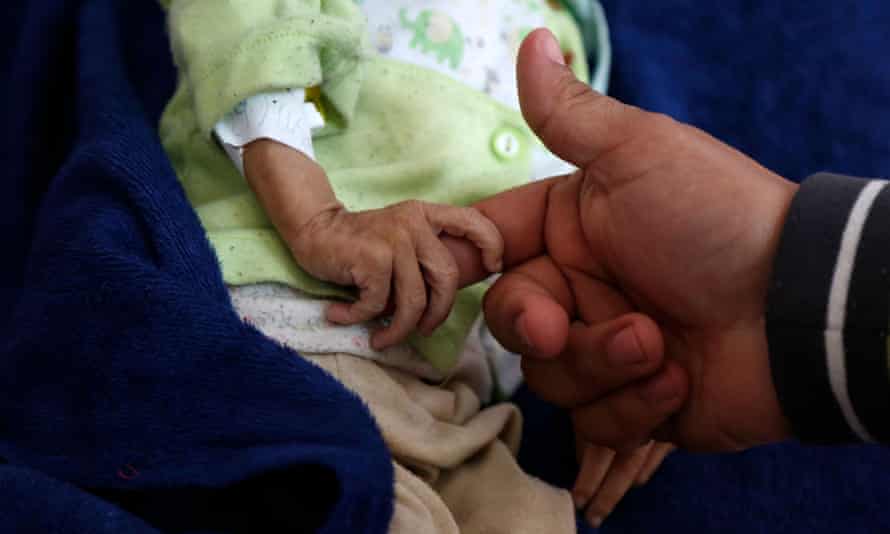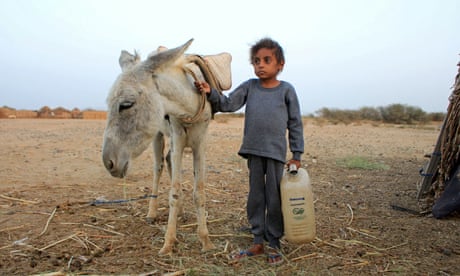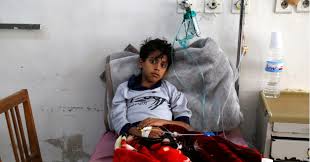I feel pride, but can’t shake my sense of failure that the World Food Programme’s media moment comes as hunger rages

Last modified on Tue 29 Dec 2020 12.45 GM
I have done the usual things you do before an awards ceremony. After extensive high-level consultation, I think I now have the right suit and tie. Carefully folded in my pocket is a long list of people to praise, many far more deserving of praise than I. I am ready.
Growing up in a small South Carolina town, I never imagined life would bring me to this moment and allow me to be part of the wonderful, blessed enterprise I have found in WFP, the World Food Programme.
I feel pride today, but also a sense of shame I cannot seem to shake. There is failure in this victory. We are having our media moment while hunger still rages.
I know that just as WFP receives this coveted award, in a nameless village in Yemen, a skeletal child will be hovering close to death, hooked to a feeding tube. You have, no doubt, seen these children in fleeting images on your television screens. Well, let me tell you those images don’t come close to the reality.
I have met these frail Yemeni children, most often in hot and dusty clinics filled with flies. The mothers usually give up on shooing the flies away and sit quietly by their sides. When you enter the room they pray you are the western miracle that has come to save their child. You know you’re not and you could not be more uncomfortable.
On occasion, a child will grab your hand or finger. You really want that to happen, but you hate it at the same time because you fear the feeding tube may not do its job. It gets hard to control your feelings, but you simply cannot let the child’s mother see tears in your eyes.
The WFP reflects the best in humanity and the worst. It exists because many of us care and it exists because many of us do not. Sadly, most hunger today is a self-inflicted wound. Six out of 10 of the world’s hungry live in countries at war with themselves – more than 400 million people.

We are losing the battle against hunger as never before. And we are losing it most in Yemen. Last week WFP and its partners Unicef and the Food and Agriculture Organization issued yet another appeal for Yemen as the crisis intensifies again. How many have there been before? I’ve lost count. In the midst of the horror of the Covid pandemic, it is a struggle to get any notice.
I have had Covid-19 and I can certainly appreciate how it has become a preoccupation, even an obsession for many. Times are tougher now than at any point in most of our lifetimes, but there are still those starving Yemeni children and millions of others. Last year hunger and malnutrition claimed twice as many children’s lives as Covid-19 has claimed worldwide so far – more than 3 million.
Hunger in Yemen is complex – fighting still rages and donor confidence is ebbing, while food prices are up 140%. As if that were not enough, there is a liquidity crisis and the Yemeni rial has collapsed, a huge blow in a country that imports 80% of its food. Millions are food insecure and famine-like conditions have begun to appear. It is, simply put, a country in chaos.
But we have brought Yemen back from the brink before. As the next chair for the G7, the UK can help gain desperately needed donor attention. The UK this year has already given £56.5m, helping us scale up cash transfers to well over 1 million Yemenis. Coping with the bitter politics in Yemen will surely test us. But if we are determined, we can succeed again.
We cannot let hunger simply fade into the background in the age of Covid-19. My dream for today is that all the feeding tubes in Yemen will suddenly vanish and those tiny children will go home smiling in the arms of the mothers.
What is happening in Yemen now is a shame. We all share that shame and we need to end it together.
• David Beasley is executive director of the UN World Food Programme
This article has been adapted from its original source
——————————————————————————————————————————————————————————
Statements, comments or opinions published in this column are of those of the author(s) and do not necessarily reflect the editorial policy of Warsan magazine. Warsan reserves the right to moderate, publish or delete a post without prior consultation with the author(s). To publish your article or your advertisement contact our editorial team at: warsan54@gmail.com

